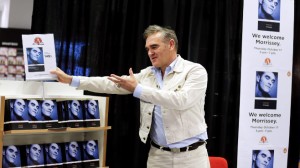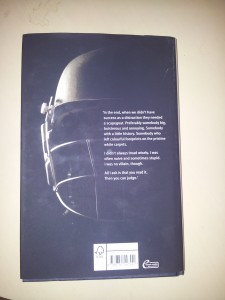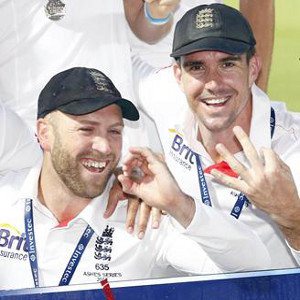
A gradual but inevitable descent into cricket-based loathing and bile.
No Such Thing As A Free Launch: Kevin Pietersen’s ‘KP’
So, as Kevin Pietersen says on the opening page, he doesn’t walk in step with everyone else. Maybe you should have given that some thought during your career eh Kev? We take no pleasure from calling you an arsehole, and we doubt Andrew Strauss uses such colourful language as he did when talking about you live on air, even when discussing the chaps from Isis.
In some respects, we feel bad about reviewing this book. Even before it officially hit the shelves on Thursday its contents had been widely discussed via a myriad of (p)reviews and Pietersen’s own interview with one of his current employers, The Daily Telegraph. The hype-machine had been in full effect as Pietersen appeared on seemingly every media platform that the BBC can offer. And of course the blasted twitter wars had been raging like the battle of Talas.
The book starts in an awkward fashion. The ghostwriter David Walsh (whose name only appears in the acknowledgements) clearly aims for urgency as Pietersen discusses the meetings with the ECB that resulted in his sacking. The result is a staccato set of short sentences. Often starting with ‘I’. Few verbs. Annoying. But it improves quickly and some of the phrases used are memorable (Peter Moores as the human triple espresso, for example). Another good thing about the book is the image on the back cover, which looks like a Daft Punk album cover as designed by Damian Hirst.
The book heads back in time to Pietersen being appointed captain in 2008. Thereafter there are a few leaps forward to 2013/14 but it largely moves chronologically, each and every word creating the context for what happened in 2012, 2013 and 2014. There are two passages where he looks back to earlier times – an all too brief chapter on family (having not read his first autobiography which was published in 2007, we would never have guessed that one of his brothers is a church minister in northern England) and life in South Africa, and a summary of why his departures from Nottinghamshire and Hampshire weren’t the massive fallings out that Graeme Swann alleged them to be. Indeed, a lot of the book appears as a defence against what he perceives as the ECB-approved clique in the dressing room, which Swann was integral to.
There’s not a lot of cricket in here, but what cricket there is never fails to be interesting, especially in understanding Pietersen’s character. His nerves before batting, his dedication to training and the way that upon arriving at the crease he would know immediately whether he was in the right frame of mind for a big innings all help portray Pietersen as having less self-confidence than would be expected – he is certainly not the Ian Botham-esque brash extrovert that he is often portrayed as.
Obviously this is but one side of the story. It’s a loud and clear statement and after reading the final chapters we can’t help but have some more sympathy with Pietersen than we did ten months ago. Like most people, he is a complex character. Having an ego doesn’t necessarily mean having self-confidence; being extraordinarily talented doesn’t equate to being flawless. But what certainly comes across is that Pietersen is the sort of person with such ability that he doesn’t understand that different people have different needs, feelings or requirements. Rarely does he accept anyone’s counter-argument: he is always right. And to some extent that’s understandable, because as he himself says, he was a rugby player who never missed a kick, until he broke his arm twice and became an off-spinner who left to go to England and became the leading international run scorer for his new country. Surely then his way is the right way, and anyone who has a different point of view is a “fucker”.
But in failing to balance differing opinions, by not accepting that Andy Flower was in some way responsible for England’s success, by ignoring some inconvenient truths and exaggerating others, the book is unlikely to radically alter what people think of him. Indeed, the vitriolic manner in which he speaks about Flower and Matt Prior is amongst the most lopsided, intense and crude attempt at assassinating character since Morrissey’s Autobiography. The points are repeated, and repeated laboriously. It wouldn’t be incorrect to say that Pietersen sounds a teeny weeny bit bitter. It’s all well and good lambasting Mike Joyce and Judge Weeks, but tell us more about how you wrote There Is A Light That Never Goes Out.

“Andy Flower. Contagiously sour. Infectiously dour. He could walk into a room and suck all the joy out of it in five seconds. Just a Mood Hoover.”
We made some initial observations in our latest podcast. Coaches who Pietersen liked are only praised (Duncan Fletcher in particular, with no mention of the 2006/07 Ashes; at the St Lucia Zouks Matt Maynard made Pietersen feel great, even though he only played twice and the Zouks were utter dross and finished bottom of the tournament). How, as new captain, Pietersen managed to get his team back to India following the Mumbai terror attacks could have been a very interesting chapter, but is dealt with matter-of-factly in a paragraph. The IPL is described as “the future” and is repeatedly one of the reasons for disagreement between Pietersen and everyone else, but in failing to give a balanced assessment of the tournament and just stating how bloody marvellous it is to socialise with Virat Kohli and Shane Watson, his case for it can be given little weight.
It’s not much of a surprise that Flower is tarred in this book, he being part of the establishment that Pietersen constantly battled with. But the animosity with which Prior is taken apart is staggering. As staunch fans of Prior, we can’t help think Pietersen is overstating the case, but it is relentless. The surprise when it was alleged, firstly by Piers Morgan on twitter and secondly in the Telegraph’s advance interview, was like the tremor felt from other great revelations – it was Kevin Spacey all along, or the point in the Street’s What is He Thinking? when it concludes that the person Simone was having an affair with was….Dan. The only bit in the book which made us laugh was the description of Matt Prior in Team Sky regalia: Le Grand Fromage getting ready for Le Tour de France. But again, it’s only Pietersen’s story and we dread that we will still be discussing this in five or ten years from now. As cricketing scandals go, it’s a long long way down the pecking order.
As for the bullying claims? Well who knows for sure? No doubt there are divisions and cliques within a dressing room, in the same way that there is any office (bar the 51allout one, obviously), or any sports team, or any extended family even. Not least when eleven men in their 20s and 30s are grouped together in a stressful environment away from home for months. But a winning dressing room is usually a happy one and a losing one miserable. We suspect the way the senior bowlers treated fielders was just amusing banter when beating India 4-0, but fucking annoying when losing to Australia and people were worried about getting their heads knocked off by Mitchell Johnson. There is a semantic debate about what constitutes bullying – and if Pietersen felt he was bullied – e.g. at the time of the parody twitter account (which with hindsight, should have been handled better by those involved and in charge) he may want to consider if there was cause. We are not making light of bullying, indeed quite the opposite – real bullying, where lives are utterly ruined, is a sickening and vile thing – but the choice of words make Pietersen sound even more bitter than he probably is.
And it is bitterness that lingers with the reader upon completing the book. No matches were fixed. Nobody was deselected due to skin colour. But it remains a sad story. Pietersen’s international story was limping towards an end anyway (he discusses his injuries and how they affected his performances a lot, but he fails to recognise they could have curtailed his career), but the core of that England team from 2010/11 deserved a better denouement than they ended up with. The fault can probably be shared between them – apart from Paul Collingwood of course, who may just have been the glue that held this team together.
Nobody really gets out of this book and the last 12 months alive. The war of words will continue. But whatever KP does next, whether coaching, commentating, turning up for T20 matches or enjoying domestic bliss with his family, what treasures would we all have given for one more magnificent innings in an England shirt from the one player who didn’t walk in step?




No Comments
Post a Comment